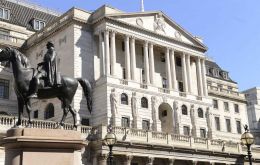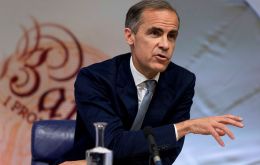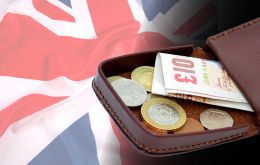MercoPress. South Atlantic News Agency
Tag: UK GDP
-
Saturday, March 23rd 2024 - 14:24 UTC
Bank of England confirms restrictive monetary policy: keeps rates unchanged

As decided by the US Federal Reserve, the Bank of England Monetary Policy Committee, (MPC) at its meeting ending on 20 March 2024, voted by a majority of 8–1 to maintain Bank Rate at 5.25%. One member preferred to reduce Bank Rate by 0.25 percentage points, to 5%.
-
Thursday, April 11th 2019 - 06:14 UTC
Stockpiling ahead of Brexit helped spur the UK economy, says stats office

Stockpiling by manufacturers ahead of Brexit helped the UK economy grow by 0.3% in the three months to February. The national s pointed to manufacturers “changing the timing of their activities” as the UK's exit from the EU approaches.
-
Thursday, August 9th 2018 - 06:38 UTC
Pound falls below US$ 1.29 for the first time in almost a year

The pound has fallen below US$1.29 for the first time in almost a year on continuing worries Britain will leave the EU without a trade deal. Sterling also hit a nine-month low against the euro, and was down against the yen and Swiss franc.
-
Wednesday, January 31st 2018 - 08:55 UTC
UK economy expands 0.5% in fourth quarter and 1.8% for the whole of 2017

The UK economy expanded at a slightly faster pace in the fourth quarter on services and manufacturing output, but the full-year growth was the weakest in five years, preliminary data from the Office for National Statistics showed. GDP grew 0.5% sequentially in the fourth quarter, while the rate was forecast to remain unchanged at 0.4%.
-
Wednesday, July 5th 2017 - 07:30 UTC
Britain's growth prospects downgraded because of “newly created uncertainty”

Economists have downgraded Britain’s growth prospects in the wake of political uncertainty following the general election and as a prolonged Brexit drag on business investment looms. New forecasts by the Centre for Economics and Business Research (Cebr) show that the UK economy will grow by just 1.3% in 2017, a substantial downward revision from an earlier forecast of 1.7%.
-
Saturday, August 9th 2014 - 06:33 UTC
Bank of England inflation forecast, next week could give an idea on future hike

The Bank of England opted this week to keep its main interest rate at a record-low level of 0.50% against a backdrop of solid British economic growth. The central bank's nine-member monetary policy committee decided also to maintain the level of cash stimulus in the economy at £375 billion, it said in a statement.
-
Thursday, March 24th 2011 - 06:32 UTC
Bank of England remains divided 6 to 3 on interest rate hike

Six members of the Bank of England’s nine-strong Monetary Policy Committee, including Governor Mervyn King, continued to oppose the minority campaign for an immediate rise in benchmark UK interest rates at the MPC’s meeting two weeks ago, minutes revealed Wednesday.
